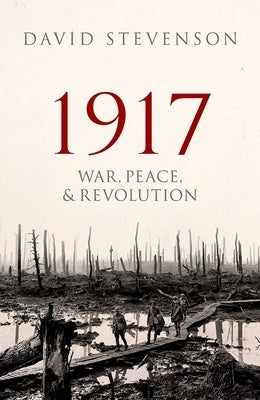Oxford University Press, USA
1917: War, Peace, and Revolution
1917: War, Peace, and Revolution
Couldn't load pickup availability
this one year the war was transformed, but also what drove the conflict onwards and how it continued to escalate. Two developments in particular - the Russian Revolution and American intervention - had worldwide repercussions. Offering a close examination of the key decisions, David Stevenson considers Germanys campaign of submarine warfare, America's declaration of war in response, and Britain's frustration of
German strategy by adopting the convoy system, as well as why (paradoxically) the military and political stalemate in Europe persisted. 1917 offers a truly international understanding of events, including abdication of Tsar Nicholas II, the disastrous spring offensive that plunged the French army into mutiny, on the summer attacks that undermined the moderate Provisional Government in Russia and exposed Italy to national humiliation
at Caporetto, and on the British decision for the ill-fated Third Battle of Ypres (Passchendaele). David Stevenson also analyzes the global consequences of the years developments, describing how countries such as Brazil and China joined the belligerents, how Britain offered responsible government to India, and how the Allies promised a Jewish national home in Palestine. Blending political and
military history, and moving from capital to capital and from the cabinet chamber to the battle front, the book highlights the often tumultuous debates through which leaders entered and escalated the war, and the paradox that continued fighting was justifiable as the shortest road toward peace.
Author: David Stevenson
Publisher: Oxford University Press, USA
Published: 01/02/2018
Pages: 430
Binding Type: Hardcover
Weight: 1.80lbs
Size: 9.30h x 6.10w x 1.80d
ISBN: 9780198702382
Review Citation(s):
Publishers Weekly 10/23/2017
Kirkus Reviews 11/01/2017
About the Author
David Stevenson holds the Stevenson Chair of International History at the London School of Economics & Political Science, where he has twice been Head of Department and teaches and lectures on the history of international relations. He is the author and editor of seven books about the origins, course, and consequences of the First World War. His publications include Armaments and the Coming of War: Europe, 1904-1914 (OUP, 1996), 1914-1918: The History of the First World War (Penguin, 2004), With Our Backs to the Wall: Victory and Defeat in 1918 (Penguin, 2011), and (co-edited with Thomas Mahnken and Joseph Maiolo), Arms Races in International Politics: from the Nineteenth to the Twenty-First Century (OUP, 2016).
Share


